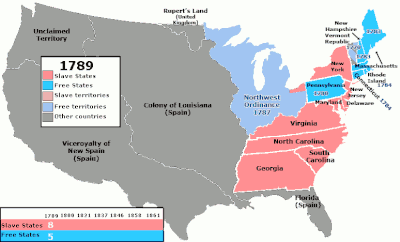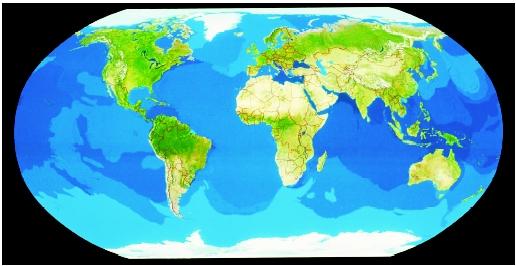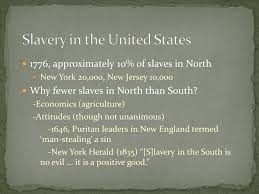Billiejeens
Diamond Member
- Jun 27, 2019
- 32,789
- 21,358
- 1,845
What in the story is fake?"Democracy Now"
is the clear sign that the story will be fake.
Is it the entire premise?
Yes.
Follow along with the video below to see how to install our site as a web app on your home screen.

Note: This feature currently requires accessing the site using the built-in Safari browser.
What in the story is fake?"Democracy Now"
is the clear sign that the story will be fake.

You don't think Somerset's case gave the colonists the perception that England was moving towards abolition? Can you give a good reason why?What in the story is fake?"Democracy Now"
is the clear sign that the story will be fake.
Is it the entire premise?
Yes.
How Slavery Helped Build a World Economy
"Each plantation economy was part of a larger national and international political economy.
"The cotton plantation economy, for instance, is generally seen as part of the regional economy of the American South.
"By the 1830s, 'cotton was king' indeed in the South.
"It was also king in the United States, which was competing for economic leadership in the global political economy.
"Plantation-grown cotton was the foundation of the antebellum southern economy.
But the American financial and shipping industries were also dependent on slave-produced cotton.
"So was the British textile industry.
"Cotton was not shipped directly to Europe from the South.
"Rather, it was shipped to New York and then transshipped to England and other centers of cotton manufacturing in the United States and Europe.
"As the cotton plantation economy expanded throughout the southern region, banks and financial houses in New York supplied the loan capital and/or investment capital to purchase land and slaves."

Is indentured servitude as relevant to this thread as the threat of colonial slave insurrection was?Maybe the dingbat OP should study up on Merry Olde England and indentured servitude
“Counter-Revolution of 1776”: Was U.S. Independence War a Conservative Revolt in Favor of Slavery? | Democracy Now!
"The fact of the matter is, is that Spain had been arming Africans since the 1500s. And indeed, because Spain was arming Africans and then unleashing them on mainland colonies, particularly South Carolina, this put competitive pressure on London to act in a similar fashion.
"The problem there was, is that the mainland settlers had embarked on a project and a model of development that was inconsistent with arming Africans. Indeed, their project was involved in enslaving and manacling every African in sight.
"This deepens the schism between the colonies and the metropolis—that is to say, London—thereby helping to foment a revolt against British rule in 1776."
Indentured servitude was basically slavery you dumbed down loon.
Stop copying and pasting crap nobody reads anyway
"AMY GOODMAN: So, as we move into the Independence Day weekend next weekend, what do you say to people in the United States?Indentured servitude was basically slavery you dumbed down loon.
Stop copying and pasting crap nobody reads anyway
Point out any historical inaccuracies in the link."Democracy Now"
is the clear sign that the story will be fake.
How Slavery Helped Build a World Economy
"Each plantation economy was part of a larger national and international political economy.
"The cotton plantation economy, for instance, is generally seen as part of the regional economy of the American South.
"By the 1830s, 'cotton was king' indeed in the South.
"It was also king in the United States, which was competing for economic leadership in the global political economy.
"Plantation-grown cotton was the foundation of the antebellum southern economy.
But the American financial and shipping industries were also dependent on slave-produced cotton.
"So was the British textile industry.
"Cotton was not shipped directly to Europe from the South.
"Rather, it was shipped to New York and then transshipped to England and other centers of cotton manufacturing in the United States and Europe.
"As the cotton plantation economy expanded throughout the southern region, banks and financial houses in New York supplied the loan capital and/or investment capital to purchase land and slaves."

Why didn't the hundreds of other countries that benefited from slaves become the world economic power?
The US was relatively isolated by two great oceansWhy didn't the hundreds of other countries that benefited from slaves become the world economic power?

I hate to burst your little snot bubble but it`s still legal to be black. Congratulations on knowing how to use Google.I googled... he's black.
How much of the historical events we celebrate today stem from colonial fears that England was about to outlaw slavery?

" We should understand that July 4th, 1776, in many ways, represents a counterrevolution.
"That is to say that what helped to prompt July 4th, 1776, was the perception amongst European settlers on the North American mainland that London was moving rapidly towards abolition.
"This perception was prompted by Somerset’s case, a case decided in London in June 1772 which seemed to suggest that abolition, which not only was going to be ratified in London itself, was going to cross the Atlantic and basically sweep through the mainland, thereby jeopardizing numerous fortunes, not only based upon slavery, but the slave trade."
“Counter-Revolution of 1776”: Was U.S. Independence War a Conservative Revolt in Favor of Slavery? | Democracy Now!
Even if it were a concern it wasn't very high on a list of concerns.
The first anti-British rebellions in the USA were the Pine Tree Riots against British taking American Eastern White Pines, and Prendergast's Rentwar against British lending property laws in New York, not to mention the Boston Tea Party over Taxation over Tea.Chattel slavery exerted a much greater effect on the colonial economy in 1776 than did Eastern White Pines, Prendergast's Rent war, and Boston tea combined.The first anti-British rebellions in the USA were the Pine Tree Riots against British taking American Eastern White Pines, and Prendergast's Rentwar against British lending property laws in New York, not to mention the Boston Tea Party over Taxation over Tea.

Chattel Antebellum Manumission Abolitionism Sectionalism The “peculiar institution” (slavery) Secede. - ppt download
Some might argue that the war was about the Indian lands and the moneyed interests that wanted to seize and sell them. The proclamation of 1763 banned settling lands west of the Appalachians.Point out any historical inaccuracies in the link."Democracy Now"
is the clear sign that the story will be fake.
“Counter-Revolution of 1776”: Was U.S. Independence War a Conservative Revolt in Favor of Slavery? | Democracy Now!
"Well, next weekend, the United States celebrates the Fourth of July, the day the American colonies declared their independence from England in 1776.
"While many Americans will hang flags, participate in parades and watch fireworks, Independence Day is not a cause for celebration for all. For Native Americans, it is yet another bitter reminder of colonialism, which brought fatal diseases, cultural hegemony and full-out genocide.
"Neither did the new republic’s promise of life, liberty and the pursuit of happiness extend to African Americans.
"As our next guest notes, the white colonists who declared their freedom from the crown did not share their newly founded liberation with the millions of Africans they had captured and forced into slavery."
How much of the historical events we celebrate today stem from colonial fears that England was about to outlaw slavery?

" We should understand that July 4th, 1776, in many ways, represents a counterrevolution.
"That is to say that what helped to prompt July 4th, 1776, was the perception amongst European settlers on the North American mainland that London was moving rapidly towards abolition.
"This perception was prompted by Somerset’s case, a case decided in London in June 1772 which seemed to suggest that abolition, which not only was going to be ratified in London itself, was going to cross the Atlantic and basically sweep through the mainland, thereby jeopardizing numerous fortunes, not only based upon slavery, but the slave trade."
“Counter-Revolution of 1776”: Was U.S. Independence War a Conservative Revolt in Favor of Slavery? | Democracy Now!
Even if it were a concern it wasn't very high on a list of concerns.
The first anti-British rebellions in the USA were the Pine Tree Riots against British taking American Eastern White Pines, and Prendergast's Rentwar against British lending property laws in New York, not to mention the Boston Tea Party over Taxation over Tea.Chattel slavery exerted a much greater effect on the colonial economy in 1776 than did Eastern White Pines, Prendergast's Rent war, and Boston tea combined.The first anti-British rebellions in the USA were the Pine Tree Riots against British taking American Eastern White Pines, and Prendergast's Rentwar against British lending property laws in New York, not to mention the Boston Tea Party over Taxation over Tea.

Chattel Antebellum Manumission Abolitionism Sectionalism The “peculiar institution” (slavery) Secede. - ppt download
I'm calling BS on that , especially considering there were no formal British plans to eliminate slavery in the states at that time.
If anything they colonists were more afraid of becoming oppressed & without say by the British Empire.
Some colonists were also afflicted by the "Black Scare:"I'm calling BS on that , especially considering there were no formal British plans to eliminate slavery in the states at that time.
If anything they colonists were more afraid of becoming oppressed & without say by the British Empire.
Some might argue that the war was about the Indian lands and the moneyed interests that wanted to seize and sell them. The proclamation of 1763 banned settling lands west of the Appalachians.Point out any historical inaccuracies in the link."Democracy Now"
is the clear sign that the story will be fake.
“Counter-Revolution of 1776”: Was U.S. Independence War a Conservative Revolt in Favor of Slavery? | Democracy Now!
"Well, next weekend, the United States celebrates the Fourth of July, the day the American colonies declared their independence from England in 1776.
"While many Americans will hang flags, participate in parades and watch fireworks, Independence Day is not a cause for celebration for all. For Native Americans, it is yet another bitter reminder of colonialism, which brought fatal diseases, cultural hegemony and full-out genocide.
"Neither did the new republic’s promise of life, liberty and the pursuit of happiness extend to African Americans.
"As our next guest notes, the white colonists who declared their freedom from the crown did not share their newly founded liberation with the millions of Africans they had captured and forced into slavery."
England certainly provided the colonists with some solid reasons for seeking independence.Some might argue that the war was about the Indian lands and the moneyed interests that wanted to seize and sell them. The proclamation of 1763 banned settling lands west of the Appalachians